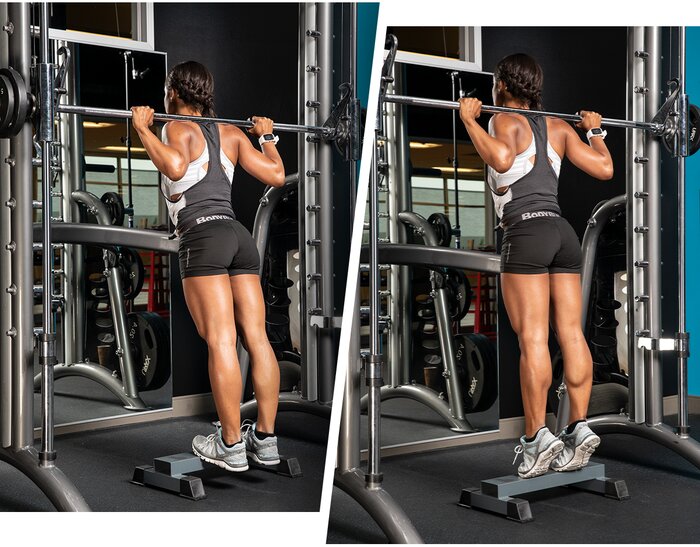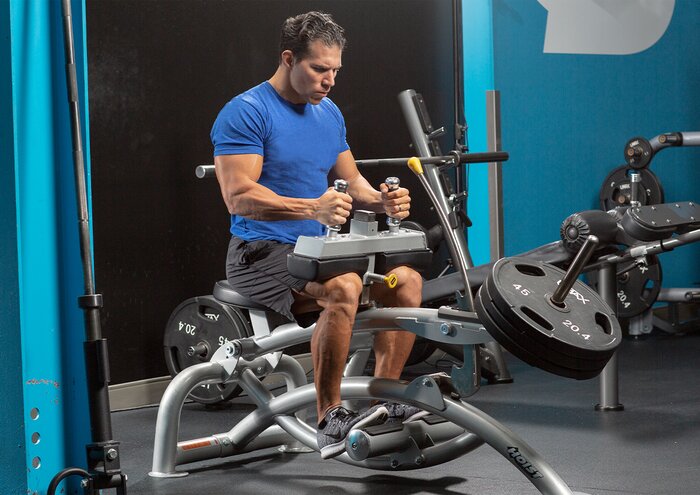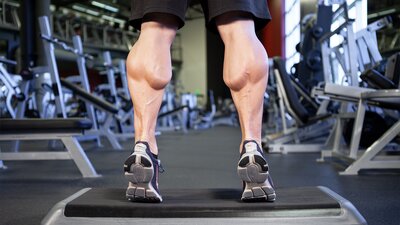Ever see the guys with skinny chicken legs in the gym and on the beach? To be symmetrical, your calves should be around the same size as your arms. Are yours close? Many bodybuilders are in denial about their weak areas and do not bring them up to improve their symmetry. Arnold Schwarzenegger came to the United States with great arms and pecs, but he had skinny calves. Arnold focused on his weak areas to gain symmetry and became Mr. Olympia.
Think of the three foundations of bodybuilding as an upside-down triangle. On one side, you have exercise, another is nutrition, and the third is recovery. If any one of the three angles is weak, the triangle will fall, meaning that you will not increase muscle size. That applies to all your muscles, including calves. If your calves are not growing, consider these five reasons why and learn how you can use the three foundations of bodybuilding to grow them.
1. Defeatist Attitude
"My calves won't grow." How many times have you heard that? Or said it? If you think you cannot grow your calves, you're right—they will not grow. It becomes a self-fulling prophecy. Although genetics does play a role, you can still increase your calf size. How you talk to yourself is a powerful predictor of success. As Zig Ziglar famously said, "No stinking thinking."

What to do about it: Develop a positive attitude. Stop blaming genetics and thinking negatively. Use positive affirmations, such as, "My calves are growing." By changing your attitude and following the advice below you can feel and see your calves growing.
2. Lack of Volume
How many days and with how many sets do you train your biceps each week? How many for calves? Maybe you should be doing more.
What to do about it: Train your calves 6-7 days a week. You have probably heard that you should not work a muscle two days in a row, but calves are the exception because they are hard to grow. Troy Adashun has described how he grew his calves by working them for 30 days straight, at home on his stairs, without any weight. I did it by putting books and weights in my backpack.
A good way to increase your volume is to follow the advice of Mr. Universe Reg Park, who was Arnold Schwarzenegger's mentor. When Schwarzenegger went to train with Park, they did calf raises at the end of every workout. If you work your calves hard 2-3 times per week, all you have to do to increase your volume is to add some sets on the days when you don't train calves.
Doing 3-5 sets takes only 5-10 minutes a day. Don't tell me you can't find 5-10 minutes to grow your calves. If you do not want to train calves after upper-body work in the gym, you can do sets at home, resting 15-30 seconds between sets, before or after your workout and on your days off from the gym.
Also pay attention to calf symmetry. If one of your muscles is smaller than the other, pre-exhaust it by starting with one or more sets for it.
3. Lack of Mind-Muscle Connection and Pump
At the gym, I see too many people with their minds wandering. They are looking at screens, talking to people, and other distractions. Are you one of those people?
What to do about it: Focus on the mind-muscle connection, and stay focused. If you can, look at your calves while working them and visualize them getting larger. Feel every rep as you squeeze your muscles at the top and bottom of the exercise.
Also, don't forget to chase that pump. Although it is good to do some heavy sets with lower reps, you also need to use lighter weights or no weight for higher reps to get a good pump. A pre-workout drink can help.

4. Lack of Full Range of Motion and Using Too Much Weight
You've probably heard that you should train with heavy weights—as heavy as you can—but with control and a full range of motion. That's the goal, but I see plenty of lifters tossing around heavy weights with a short range of motion. Essentially, they throw up the weight rather than lift it and let it drop and bounce back up. Then they wonder why their muscles are not growing. Is that your training style?
What to do about it: To get a full range of motion on calf exercises, you need to get up on your toes and then go into a low stretch. Pause for 2-5 seconds at the top and bottom of each rep and feel the burn. Mr. Olympia Frank Zane says to focus on lowering the weight slowly; you get as much or more growth from the negative motion. If the gym permits, take off your shoes. Working calves barefoot gives you the best range of motion.
How much weight is too much? Use a weight that will allow you to get at least 10 slow reps, with a pause and squeeze on every rep. Doing 15-25 reps works better for getting a good pump. Occasionally, do 100 reps.
5. Lack of Intensity and Variety
Arnold Schwarzenegger believes that muscles get used to performing the same workout and stop growing. You need to "shock" the muscles to get them to grow. That means working them with great intensity and lots of variety.
What to do about it: Working slowly through a full range of motion with a pause and flex on each rep gives you intensity. You can change the intensity by varying the pause from 1-5 seconds or even 10 seconds. On your last set, hold the last rep at the top, middle, and bottom for as long as you can.
Regarding exercise variety, any calf raise will grow your two calf muscles, but you can add variety by performing two exercises: standing and donkey calf raises to hit your gastrocnemius (outer calf) and seated raises to work your soleus (inner calf). Although, make no mistake, both variations hit both muscles. Pointing your toes in further targets the outer muscle, while pointing your toes out hits the inner muscle. Changing the space between your feet will give you additional options variety.
Another tactic is to vary your rest between sets to 30, 45, or 60 seconds. You can also work the tibialis anterior (front calf) with barbell raises.
If your gym has a standing calf raise, donkey, and a seated machine, use them. If not, and for variety, you can use the Smith machine. Place a high surface under the machine, stand on it, put the bar on your shoulders, and exercise; for variety you can hold the bar in a deadlift position. You can also use the leg extension machine by placing your toes on the bottom and moving the weight up and down with your legs stiff.

If you cannot go to the gym, focus on calves at home. If you do not have weights at home, fill a backpack with books or other heavy items and wear it during your calf work, or fill a duffel bag or small suitcase and hold it. To add more weight, in effect, work one calf at a time, supersetting left and right calves without a rest.
To get the best stretch, you want a surface that lets you put the balls of your feet and toes on it while the rest of your foot hangs off the surface. A 2x4 board is most likely not high enough to give you a full bottom stretch. Instead, use stairs for standing calf raises, and use a 4x4 for seated calf raises, placing the weight on your knees. You can also bend at the waist on the stairs to do a form of donkey calf raise.
A Word of Caution
If you are not already using these calf methods, or you are increasing your volume and intensity, start slowly with a few sets. Otherwise, you will be in pain in the next day or two, and you can forget about running.
Nutrition: Supplements for Growing Muscles
Larry Scott, the first Mr. Olympia, believed that if you are not taking enough supplements, you won't be a successful bodybuilder. I am not saying you need to take all the supplements listed below, but they can all help. And when your goal is to add size a notoriously difficult-to-grow muscle group like calves, you can use all the help you can get.
1. Protein and Creatine
When muscle gain is the goal, aim for 1 g for every pound of body weight. To accomplish that, you'll need to prioritize it in your day. I recommend having 1-2 scoops in a post-workout shake after every workout, along with protein-rich meals every 2-4 hours.
Creatine is also a no-brainer for muscle growth. There is no consensus on when to take creatine, but perhaps the easiest way to remember is to dump it in your post-workout shake.
2. Pre-workout
A pre-workout supplement will help you focus and give you energy to train hard. I buy any brand that is on sale at Bodybuilding.com that contains the basic BCAAs, beta-alanine, and caffeine. I add creatine to my drink and usually fruit for extra carb energy. Because I have trouble getting a pump, I also add 6-8 grams of L-citrulline with malate.*
3. Post-workout
When you exercise your muscles, you deplete the glycogen in them. Carbs help to replace it. If you get only protein, your body will change the protein into carbs, and you will have wasted time and money.
You have several options for how to take in those carbs. You can take a post-workout supplement that includes at least 20 grams of carbohydrates, but many of them have low or no protein. You can eat some carbs with protein in the form of protein bars. You can also use weight-gain protein powder. Just make sure you are getting good quality complex carbs, not simple sugar. Use a weight-gain protein powder if you want to gain weight or increase your carbs and fat when you mix your protein shakes.*
Recovery: Needed to Grow Muscles
1. Rest
Avoid getting stressed as it can hurt you physically and it hinders muscle growth. During the day and before bed, do something you enjoy that is relaxing.
2. Sleep
Good quality sleep is essential for muscle growth. While you sleep, your body produces testosterone, which builds muscles. ZMA helps you get a good night's sleep, which, in turn, helps maintain or increase your testosterone levels. It also helps to feed your muscles protein while you sleep. Four options are to have a regular or weight-gain protein shake, or, preferably, a protein powder with a blend of fast- and slow-digesting proteins, or a casein protein to feed your muscles all night long.*
The Secret to Bodybuilding
The secret is hard work and balancing the triangle: exercise, nutrition, and recovery. The question isn't, "do these methods work?" it's, "will you do the work?" It took me decades to exercise properly and to balance my exercise with better nutrition and recovery. Today, I look better than ever and continue to make gains. Here's hoping you are a faster learner.
*These statements have not been evaluated by the Food and Drug Administration. This product is not intended to diagnose, treat, cure, or prevent any disease.



